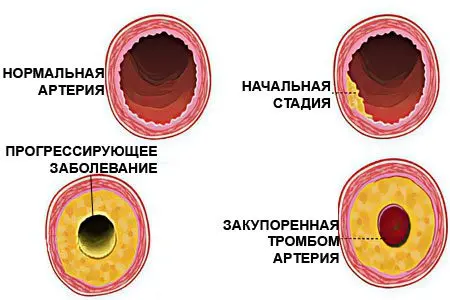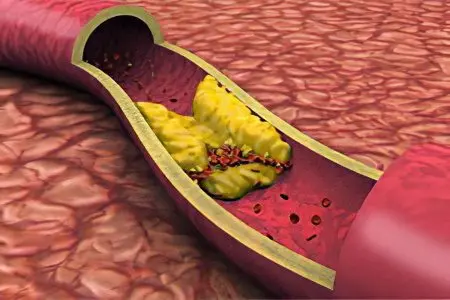Contents
Cholesterol – This is a fat-like substance that is part of almost all living organisms. It should be understood that only 20-30% of it enters the body with food. The rest of cholesterol (synonymous with cholesterol) is produced by the body itself. Therefore, the reasons for the increase in its level in the blood can be many.
High cholesterol – what does it mean?
Doctors talk about an increase in the level of cholesterol in the blood when the indicators exceed the norm by more than a third. In healthy people, the cholesterol level should be less than 5,0 mmol / l (you can find out more here: the norm of cholesterol in the blood by age). However, not all the fat-like substance contained in the blood is dangerous, but only low-density lipoproteins. They pose a threat due to the fact that they tend to accumulate on the walls of blood vessels and after a certain time period form atherosclerotic plaques.
On the surface of the growth inside the vessel, a thrombus gradually begins to form (consisting mainly of platelets and blood proteins). It makes the vessel even narrower, and sometimes a small piece breaks off from the clot, which moves along with the blood flow through the vessel to the point where the vessel narrows completely. That’s where the clot gets stuck. This leads to the fact that blood circulation is disturbed, from which a certain organ suffers. Often, the arteries of the intestines, lower extremities, spleen and kidneys are blocked (at the same time, doctors say that a heart attack of one or another organ has occurred). If the vessel that feeds the heart suffers, then the patient has a myocardial infarction, and if the vessels of the brain, then a stroke.

The disease progresses slowly and imperceptibly for a person. A person can feel the first signs of a lack of blood supply to an organ only when the artery is clogged by more than half. That is, atherosclerosis will be in a progressive stage.
How exactly the disease manifests itself will depend on where the cholesterol began to accumulate. If the aorta becomes blocked, the person will begin to experience symptoms of hypertension. He is also at risk of an aortic aneurysm and death if appropriate therapeutic measures are not taken in time.
If cholesterol clogs the aortic arches, then eventually this will lead to the fact that the blood supply to the brain will be disrupted, this causes symptoms such as fainting, dizziness, and then a stroke develops. If the coronary arteries of the heart are clogged, then the result is coronary disease of the organ.
When a blood clot forms in the arteries (mesenteric) that feed the intestines, the tissues of the intestine or mesentery may die. Also, an abdominal toad is often formed, causing colic in the abdomen, its swelling and vomiting.
When the renal arteries are affected, it threatens a person with arterial hypertension. Violation of the blood supply to the vessels of the penis leads to sexual dysfunction. Violation of the blood supply to the lower extremities leads to the appearance of pain in them and developing lameness, which is called intermittent.
As for statistics, most often an increase in blood cholesterol levels is observed in men over 35 years of age and in women who have entered menopause.
So, high cholesterol in the blood can only mean one thing – serious disorders occur in the body, which, if the necessary measures are not taken, will eventually lead to death.
Causes of high cholesterol

The reasons that lead to the fact that the level of cholesterol remains stably elevated may be as follows:
A person has hereditary diseases. Among them are polygenic familial hypercholesterolemia, hereditary dysbetalipoproteinemia and combined hyperlipidemia;
Kidney disease, for example, renal failure, nephroptosis, glomerulonephritis;
High blood pressure;
Coronary heart disease;
Gout;
Werner’s syndrome;
Analbuminemia;
Liver pathologies, in particular, chronic and acute hepatitis, cirrhosis, extrahepatic jaundice, subacute liver dystrophy;
Pathology of the pancreas, it can be acute and chronic pancreatitis, organ tumors;
The presence of diabetes.
Hypothyroidism;
Age-related diseases that most often appear in people who have crossed the line of 50 years;
Malignant tumors of the prostate;
Insufficient production of somatotropic hormone;
The period of bearing a child;
Obesity and other metabolic disorders;
Malnutrition;
Megaloblastic anemia;
Obstructive pulmonary diseases of a chronic nature;
Rheumatoid arthritis;
Taking certain medications, for example, androgens, adrenaline, chlorpropamide, glucocorticosteroids;
Smoking, moreover, it is enough to be just a passive smoker;
Alcoholism or simply the abuse of alcoholic beverages;
Sedentary lifestyle and lack of minimal physical activity;
Excessive consumption of junk and fatty foods. Here, however, it is worth mentioning that this is not about switching to a cholesterol-free diet, but about reducing the amount of fatty and fried foods consumed.
What is dangerous high cholesterol?

There are certain threats to a person’s health if he has a persistent increase in blood cholesterol levels. Many do not perceive this as a cause for concern. However, this fact should not be ignored, as it leads to a number of cardiovascular pathologies, which eventually become the causes of heart attacks and strokes.
Even despite the fact that there are a huge number of drugs and a wide variety of methods for the treatment of diseases of the heart and blood vessels, these pathologies occupy the first place among all diseases leading to death among the population of the whole world. The World Health Organization provides clear figures: 20% of strokes and 50% of heart attacks are due precisely to the fact that people have high cholesterol levels. However, do not despair if a high level of this substance in the blood has been detected, since cholesterol can and should be controlled.
However, in order to realistically assess the threat of risk, it is necessary to clearly understand what constitutes dangerous and non-dangerous cholesterol:
LDL is the so-called “bad” cholesterol. It is the increase in its level that threatens to clog the arteries, and as a result, there is a threat of the formation of strokes and heart attacks. Therefore, it is necessary to strive to ensure that its blood levels do not exceed the mark of 100 mg / dl. However, these are indicators for an absolutely healthy person. If there is a history of heart disease, then LDL levels should be reduced to at least 70 mg/dL;
“Good” cholesterol reduces the content of “bad”. He is able to join the “bad” cholesterol and transport it to the liver, where after certain reactions it will be naturally excreted from the human body;
Another type of unhealthy fat is called triglycerides. They also circulate in the blood and, like LDL, increase the risk of developing deadly diseases. Their blood levels should not exceed 50 mg/dl.
Cholesterol circulates in the bloodstream of every person, and if the level of “bad” fats begins to rise, then it, or rather, its excess, tends to be deposited on the walls of blood vessels, narrowing the arteries over time, so that blood cannot pass through them as before. And their walls become fragile. Plaques form around which a blood clot forms. It disrupts the blood supply to a particular organ and tissue ischemia occurs.
The risks of not being diagnosed with high cholesterol are as high as the number of deaths that result from this process. This is due to the fact that high cholesterol manifests itself very late in the form of certain symptoms.
That is why it is so important to pay attention to:
The presence of pain in the lower extremities when walking;
The appearance of xanthomas, or yellow spots on the skin;
The presence of excess weight;
Contractive pains in the region of the heart.
If there is at least one of these signs, it is necessary to consult a doctor as soon as possible and pass the appropriate tests.
6 myths about high cholesterol

However, don’t get too carried away thinking about cholesterol for no particular reason. Many people are so sure that it is a deadly threat, so they try by all available means to reduce their intake from food. For this, various diets are used that involve the exclusion of fat-containing foods from the diet. However, doing so is not entirely correct, since as a result you can cause even more harm to your health. In order to maintain normal cholesterol levels, and at the same time not cause damage to your own body, you need to familiarize yourself with the most common myths.
6 myths about high cholesterol:
Cholesterol can enter the body only with food. In fact, this is a common misconception. On average, only 25% of these fats enter the bloodstream from outside. The rest of it is produced by the body itself. Therefore, even if you try to reduce the level of these fats with the help of various diets, you still won’t be able to “remove” its significant share. Doctors recommend sticking to a cholesterol-free diet not for the purpose of prevention, but only for medicinal purposes, when the level of these fats really rolls over. In the food set, which allows you to eliminate excess cholesterol, there should be no hard cheeses, milk with a high percentage of fat, and pork. In addition, palm and coconut oil, which abounds in ice cream, pastries and almost all confectionery, causes harm.
Any cholesterol is harmful to human health. However, it is not. One, namely LDL, is really capable of leading to serious diseases, and another type of cholesterol, namely HDL, on the contrary, serves to neutralize the threat. In addition, “bad” cholesterol is dangerous only if its level really exceeds the norm.
Cholesterol levels that are higher than normal lead to the development of diseases. In fact, no disease can be caused by high cholesterol. If the indicators are too high, then you should pay attention to the reasons that led to this. This may be a signal of the pathology of the kidneys, liver, thyroid gland and other organs or systems. Not cholesterol is the culprit of heart attacks and strokes, but poor nutrition, frequent stress, a sedentary lifestyle and bad habits. Therefore, it is useful to know that blood triglycerides and total cholesterol should not exceed 2,0 and 5,2 mmol per liter, respectively. At the same time, the level of high and low density cholesterol should not be higher than 1,9 and 3,5 mmol per liter. If low-density fats are overestimated, and high-density fats, on the contrary, are low, then this is the most dangerous signal of trouble in the body. That is, “bad” cholesterol prevails over “good”.
The most serious danger signal is an increase in the level of cholesterol in the blood. This is another common myth. It is much more dangerous to find out that it is the level of triglycerides that is overestimated.
Cholesterol reduces life expectancy. Most people believe that with a lower level of total cholesterol, the number of years lived increases significantly. However, studies were conducted in 1994 proving that this is not an absolute truth. Until now, there is not a single more or less convincing argument in favor of this widespread myth.
Medicines can help reduce blood cholesterol levels. This is not entirely true, since statins are extremely harmful to the body. But there are natural products, consuming which in food, you can achieve a decrease in overestimated indicators. For example, we are talking about nuts, olive oil, ocean fish and some others.
How to treat high cholesterol?

In order to lower the level of cholesterol in the blood, both drugs and non-drug methods are used.
Physical exercise
Adequate physical activity will help lower cholesterol levels:
Firstly, regular exercise helps the body remove fat that has entered the bloodstream with food. When “bad” lipids do not stay in the bloodstream for a long time, they do not have time to settle on the walls of blood vessels. It has been proven that running promotes the removal of fat from foods. It is people who regularly run who are least susceptible to the formation of cholesterol plaques;
Secondly, ordinary physical exercises, gymnastics, dancing, prolonged exposure to fresh air and regular stress on the body allow you to keep muscle tone, which has a positive effect on the state of blood vessels;
Walking and regular exercise are especially important for the elderly. However, you should not strain too much, as an increase in heart rate can also adversely affect the health of an elderly person. In everything, it is necessary to observe the measure, and in the fight against excess cholesterol, too.
Useful Tips
Here are 4 more extremely useful tips that will help you lower your bad cholesterol levels:
It is necessary to give up bad habits. Smoking is one of the most common factors that impair human health. All organs without exception suffer from it, in addition, the risk of developing atherosclerosis increases;
As for alcohol, in reasonable doses it can even help fight cholesterol deposits. But you can not exceed the mark of 50 grams for strong drinks and 200 grams for low-alcohol drinks. However, such a preventive method is not suitable for everyone. In addition, some doctors strongly oppose the use of alcohol, even in small doses;
Replacing black tea with green tea can lower cholesterol levels by 15%. The substances contained in it contribute to the fact that the walls of capillaries are strengthened and the level of harmful lipids is reduced. The amount of HDL, on the contrary, increases;
Consumption of some freshly squeezed juices can also be a preventive measure in the fight against cholesterol blocks. However, they must be taken correctly and in a certain dosage. In addition, not every juice has a beneficial effect on the body. Among those that do work are celery juice, carrot juice, beetroot juice, cucumber juice, apple juice, cabbage juice, and orange juice.
Food
In the fight against high cholesterol, dietary nutrition can help, in which some foods must be completely excluded, and the consumption of some should be reduced to a minimum. It is important that a person does not consume more than 300 mg of cholesterol per day along with food. Most of this substance is found in brains, kidneys, caviar, egg yolk, butter, smoked sausages, mayonnaise, meat (pork, beef, lamb). If these products contribute to the fact that the level of cholesterol in the blood will steadily rise upwards, then there are those that, on the contrary, lower it.
In particular, it is important that the diet must be present:
Mineral water, vegetable and fruit juices, but only those that were squeezed from fresh fruits;
Oils: olive, sunflower, corn. Moreover, they should become, if not a complete alternative, then at least a partial replacement for butter. It is olive oil, as well as avocados and nuts, that contain such oils that help reduce bad cholesterol;
Meat, used in the diet of a person with high cholesterol should be lean. These are types of animal products such as veal, rabbit and poultry meat, which must first be removed from the skin;
Cereals. Do not forget about whole grains, in particular, wheat, oats and buckwheat;
Fruit. Eat at least 2 servings of different fruits per day. Although the more of them, the faster the level of cholesterol in the blood will decrease. Citrus fruits are especially useful. In particular, it was found that the pectin contained in the pulp and peel of grapefruit can significantly lower cholesterol levels, up to 7%, in just two months of regular consumption;
pulse. Their main weapon in the fight against excess cholesterol is a high content of water-soluble fiber. It is she who is able to naturally remove a fat-like substance from the body. A similar effect can be achieved if bran, both corn and oat, is taken orally;
Sea fish of fatty varieties. To help people suffering from high cholesterol, fatty fish comes, containing Omega 3 in its composition. It is this substance that contributes to the fact that blood viscosity decreases significantly, and blood clots form less frequently;
Garlic. It naturally acts on cholesterol in terms of lowering its levels in the blood. However, there is one caveat – it must be consumed fresh, without prior heat treatment.
[Video] Dr. Evdokimenko explains why cholesterol rises and how to lower it:
Why is cholesterol necessary for a person. How do foods with cholesterol affect the health of the body. The myth of cholesterol in food. Why doesn’t dietary cholesterol increase cholesterol? Can you eat eggs with yolk? Why is the medical community misleading people? Why do cholesterol drugs kill? Properties and functions of lipoproteins. How many eggs can you eat per day?
Prevention of high cholesterol

Preventive measures aimed at lowering cholesterol levels are the most effective measures to combat vascular and heart diseases.
In order to prevent the formation of cholesterol plaques, the following recommendations must be followed:
Lead the right way of life. Perhaps most people will think that this is a rather banal recommendation, however, it is in the fight against high cholesterol that it is most effective. Moreover, not everyone manages to adhere to a truly healthy lifestyle, no matter how simple it may seem;
Elimination or minimization of stressful situations. Naturally, it will not be possible to completely avoid them, therefore, if you cannot cope with your own emotions, you can, on the recommendation of a doctor, take natural sedatives;
Do not overeat and reduce the intake of foods that are high in cholesterol. You should not completely abandon them if the cholesterol level is not elevated, but for the purpose of prevention, you need to adhere to a more or less healthy diet;
Hypodynamia – here is another “friend and ally” of high cholesterol. The less a person moves, the greater his risk of forming cholesterol plaques in the vessels. Therefore, regular physical activity on the body is so important;
Rejection of bad habits. Alcoholism and smoking and without cholesterol have a detrimental effect on all organs of the human body. And with an increase in cholesterol, the risks of death from heart attacks and strokes increase several times;
Regular visits to the doctor and blood donation to determine the level of cholesterol in it. This is especially true for men over 35 and for women who have entered menopause. It is in such people that there is a high risk of forming cholesterol plaques;
You need to watch your own weight. Although it does not directly affect cholesterol levels, however, diseases caused by obesity can be a factor that pushed the increase in cholesterol levels;
Elevated cholesterol levels are an occasion to look for problems and malfunctions in the body. It is always worth remembering that a very small part of cholesterol comes from food. Therefore, if its level is growing, and a person adheres to a healthy menu, then it is worth contacting a specialist to identify concomitant diseases.
According to most doctors, an increase in cholesterol levels is the fault of an inattentive attitude to one’s own health and lifestyle. In order to avoid the formation of cholesterol plaques, it is not enough just to limit certain foods on the menu. The approach should be comprehensive, and you need to start with a lifestyle.
In addition, it is always important to remember that the disease is easier to prevent than to treat it later. Moreover, cholesterol-lowering drugs have a lot of side effects.









